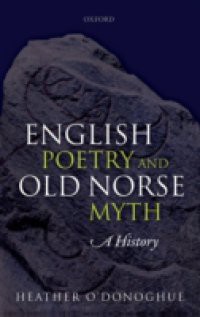English Poetry and Old Norse Myth: A History traces the influence of Old Norse myth -- stories and poems about the familiar gods and goddesses of the pagan North, such as Odin, Thor, Baldr and Freyja -- on poetry in English from Anglo-Saxon times to the present day. Especial care is taken to determine the precise form in which these poets encountered the mythic material, so that the book traces a parallel history of the gradual dissemination of Old Norsemythic texts. Very many major poets were inspired by Old Norse myth. Some, for instance the Anglo-Saxon poet of Beowulf, or much later, Sir Walter Scott, used Old Norse mythic references to lend dramatic colour and apparent authenticity to their presentation of a distant Northern past. Others, like Thomas Gray, or Matthew Arnold, adapted Old Norse mythological poems and stories in ways which both responded to and helped to form the literary tastes of their own times. Still others, such as WilliamBlake, or David Jones, reworked and incorporated celebrated elements of Norse myth - valkyries weaving the fates of men, or the great World Tree Yggdrasill on which Odin sacrificed himself - as personal symbols in their own poetry. This book also considers less familiar literary figures, showing how asurprisingly large number of poets in English engaged in individual ways with Old Norse myth. English Poetry and Old Norse Myth: A History demonstrates how attitudes towards the pagan mythology of the north change over time, but reveals that poets have always recognized Old Norse myth as a vital part of the literary, political and historical legacy of the English-speaking world.

